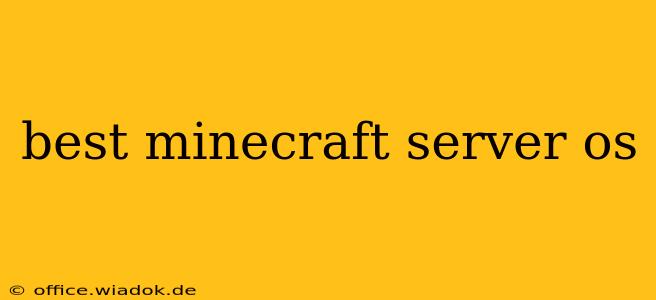Choosing the right operating system (OS) for your Minecraft server is crucial for performance, security, and ease of management. The ideal OS will depend on your server's size, the number of players, and your technical expertise. This guide explores the top contenders and helps you decide which OS best fits your needs.
Top OS Choices for Minecraft Servers
While several operating systems can host Minecraft servers, some stand out for their reliability, performance, and community support. Here's a breakdown of the most popular options:
1. Linux (Ubuntu, Debian, CentOS): The Powerhouse Choice
Linux distributions like Ubuntu, Debian, and CentOS are consistently favored by server administrators. Their strengths lie in:
- Performance: Linux is known for its efficiency and ability to handle resource-intensive tasks, making it ideal for large Minecraft servers with many players.
- Security: Linux's robust security features minimize vulnerability to attacks, protecting your server and player data.
- Customization: You have extensive control over system configurations, allowing for fine-tuning to optimize performance.
- Cost-Effectiveness: Most Linux distributions are open-source and free to use, saving you money on licensing fees.
- Community Support: A vast and active community provides ample resources, tutorials, and assistance when troubleshooting.
Specific Linux distributions for Minecraft servers:
- Ubuntu: User-friendly with a large community and readily available packages. A great starting point for beginners.
- Debian: A stable and reliable choice, ideal for servers needing maximum stability.
- CentOS: Known for its stability and enterprise-grade support, suitable for mission-critical servers.
2. Windows Server: Familiar Territory, Enterprise-Grade Features
Windows Server offers a familiar interface for users comfortable with the Windows environment. However, it comes with some trade-offs:
- Cost: Windows Server requires a license, adding to your overall server expenses.
- Resource Consumption: Compared to Linux, Windows Server can consume more resources, potentially impacting performance on less powerful hardware.
- Security: While secure, Windows Server requires diligent patching and updates to maintain its security posture.
Windows Server is a viable option if you're already familiar with the Windows ecosystem and prioritize ease of use over cost optimization. However, for larger servers, the cost and resource consumption might be significant drawbacks.
3. macOS (for Small Servers Only): Apple's Option
While macOS isn't designed for server environments, it can host a small, personal Minecraft server. It's not recommended for larger or publicly accessible servers.
Choosing the Right OS: Factors to Consider
Several factors should influence your OS choice:
- Server Size & Player Count: For small, private servers, Windows or a lightweight Linux distribution like Ubuntu Server might suffice. Large, public servers demand the performance and security of a robust Linux distribution.
- Technical Expertise: If you're new to server administration, Ubuntu Server offers a relatively user-friendly experience. More experienced administrators might prefer the customization options of Debian or CentOS.
- Budget: Linux distributions are free, whereas Windows Server requires a license, significantly impacting the total cost of ownership.
- Security Needs: Linux, particularly with proper configuration, offers stronger security features than Windows Server.
Conclusion: Linux Reigns Supreme for Most Minecraft Servers
For most Minecraft servers, Linux distributions like Ubuntu or Debian are the optimal choice. They offer a balance of performance, security, cost-effectiveness, and ease of use. Windows Server remains a viable alternative for users already invested in the Microsoft ecosystem, while macOS is only suitable for very small, private servers. Carefully weigh the factors outlined above to make the best decision for your specific Minecraft server needs.

